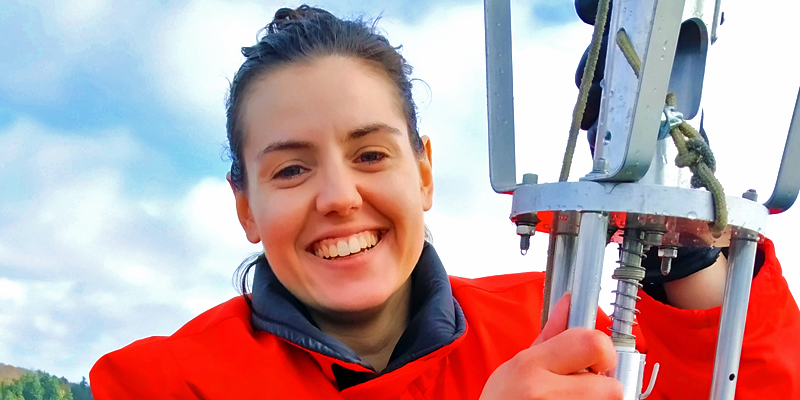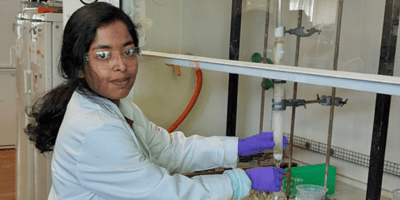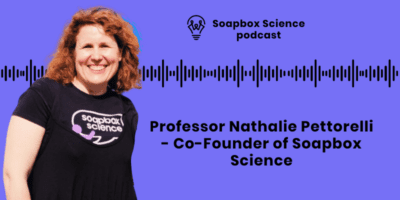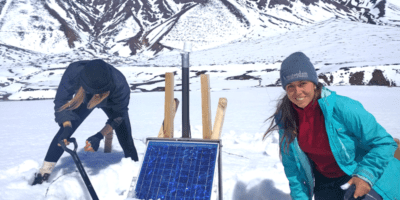Danai Kontou is PhD candidate in ecology and evolution at the University of Cambridge. In her Soapbox talk, she introduces the topic of tiny animals found near the surface in aquatic environments (zooplankton) and how they respond to environmental change and the influence of invasive species. The title of her talk is “Nature’s time machine – Mud, plankton and evolution in freshwater lakes’’, and it will take place at 2pm on Saturday 27th May 2023 at Queen’s Stone, Riverside Walkway (by Gabriel’s Wharf), South Bank, London, SE1 9PP.
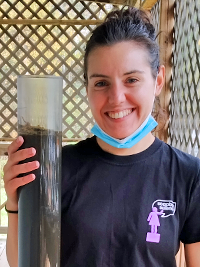
“I believe that bringing science to the public and inspiring the next generation are important responsibilities. And what better way than shouting loud and clear from atop a box: “Women belong and thrive in science too!”. You never know how many shy little girls need to hear it — I certainly used to be one of them.”
From turtles to marine worms and then kelp, with some wasps along the way
My academic journey started back in my sunny home country, Greece. I obtained a Bachelor of Science in Biology from the University of Patras, focusing on zoology and evolution with a dissertation in palaeontology.
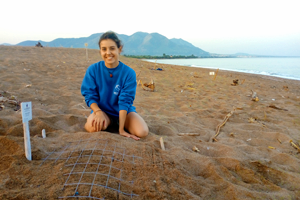
After graduating, I spent a year working and volunteering for a sea turtle protection NGO (Archelon – The Sea Turtle Protection Society of Greece). I helped rehabilitate and release many injured sea turtles, monitor nests in one of the most important turtle sites of the Mediterranean and worked as a science educator for visiting schools, communicating the importance of biodiversity conservation.
In 2018, I moved to the UK to start a research Master’s degree in Biodiversity, Evolution and Conservation at University College London (UCL). During my graduate studies, I had the opportunity to work at the Natural History Museum (NHM) and the Zoological Society of London (ZSL) and get involved in some truly exciting projects! I studied marine worms living in sponges from the depths of the Atlantic Ocean and then worked on a genetic map of the UK’s common wasp populations.
Right after, I became a research intern for ZSL funded by the People’s Trust for Endangered Species (PTES) to assist on a kelp forest restoration project with Sussex Wildlife Trust. In 2020 (and in the middle of a national lockdown), I received a scholarship to pursue a PhD in Ecology at the University of Cambridge, where I am happily based at the moment, working on my thesis.
From hanging off an overloaded canoe in the middle of a lake to sitting at a microscope in a lab wearing a pristine white lab coat
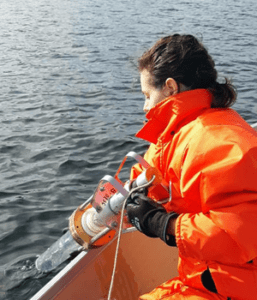
My current research focuses on the adaptations of freshwater zooplankton in response to environmental change and predation by invasive species. Predation is a biological interaction where one organism, the predator, kills and eats another organism, its prey.
Plankton is composed of phytoplankton (microscopic plant-like organisms) and zooplankton (pronounced zoh-plankton), which are typically tiny animals found near the surface in aquatic environments. They have to adapt in response to environmental change and invasive species. (An invasive species is an organism that is not indigenous, or native, to a particular area.)
In a healthy, balanced lake ecosystem, zooplankton feeding on phytoplankton helps to keep the waters safe and clear. Plankton forms a base supporting an entire ecosystem of larger organisms such as fish and by extension humans! This delicate balance can be easily disturbed though by changes in temperature, the chemistry of the water or the introduction of organisms that alter the structure of the existing food chain.
My work combines field ecology, sediment analysis, some chemistry, microscopy, lab work and bioinformatics, a little bit of everything really! When out for fieldwork, I am hanging off an overloaded canoe in the middle of a lake, pulling up sediment cores.
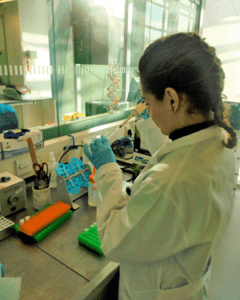
In the lab, you would see me meticulously sectioning and filtering thousands of slices of mud and then looking through them under a microscope for tiny plankton eggs. Some days you can find me in a much cleaner lab with my lab coat on, extracting DNA and preparing samples for sequencing.
If not in the lab, then one can find me in front of multiple computer screens running models, processing microscope photos and analysing hundreds of plankton genomes to find out how they have evolved in the last two centuries.
Valuable and complex
For as long as I can remember, I was fascinated by nature and wanted to be a scientist so I could wear a lab coat like the ‘cool’ people on TV documentaries. I also loved playing with mud and to this day, my parents are quite amused that I turned that into a PhD!
My research combines all my passions and interests by allowing me to spend time both outdoors and in the lab while constantly learning and developing new skills. I was initially drawn to freshwater ecology because coming from a country with a very dry climate, lakes and pine forests had a rather exotic appeal.
Freshwater ecosystems are extremely valuable and complex but also very vulnerable to climate change and do not receive anywhere near as much attention as the oceans. I hope my research on keystone lake species will positively impact the management and protection of threatened freshwater systems and the communities they sustain.
When it comes to a scientific project, it really does take a village. Science benefits greatly from collaboration and different perspectives, in fact, that is the only way forward when faced with today’s challenges. From environmental issues all the way to financial crises and pandemics, we need people from a wide range of backgrounds to contribute their ideas and knowledge, and share their vision for the future.
“Women belong and thrive in science too!”
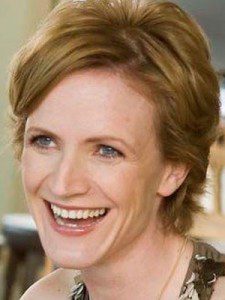
While I was still a graduate student at UCL, I was lucky enough to work with Professor Seirian Sumner, one of the founders of Soapbox Science. She introduced our cohort to the initiative as part of a science communication course and later asked me to volunteer for the 2019 London event. I had a lovely time and have been looking forward to returning as a speaker ever since!
I believe that bringing science to the public and inspiring the next generation are important responsibilities. And what better way than shouting loud and clear from atop a box: “Women belong and thrive in science too!”. You never know how many shy little girls need to hear it — I certainly used to be one of them.
Getting hands-on with ‘Natures’ time machines’
For this year’s Soapbox Science London, I will be discussing part of my PhD research and introducing the public to the fascinating field of palaeoecology, offering some hands-on experience with safe and fun materials. I will be talking about ‘nature’s time machines’ (sediments and permafrost), how lakes contain archives in their basins, and how we can study the past to understand the present better and make predictions about the future of our most vulnerable ecosystems.
I am also hoping to convince people that studying tiny plankton is cool, especially when you can hatch their eggs after hundreds of years. And yes, there will be some tiny centuries-old eggs to see on the day!
I am delighted to be featured and introduced to the Womanthology community! It is always inspiring to meet and learn about successful and brilliant women in science and beyond. Anyone wanting to learn more about the ladies in ecology and conservation who like to get their hands dirty, come find me for a chat at this year’s London Soapbox event.
Back to the field – mud, bruises and all!
With little more than a year left, I mainly look forward to completing my PhD and becoming a ‘Dr’! I am excited to start what I hope will be a long career in conservation and environmental sciences and hope I get more incredible research opportunities in the future. I also hope to see my thesis work published in the near future and I can’t wait to be back in the field as soon as possible, mud, bruises, and all!

